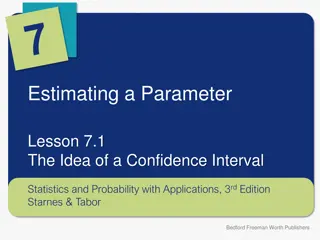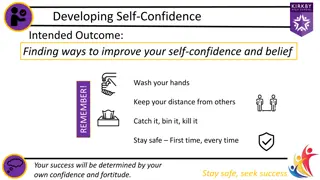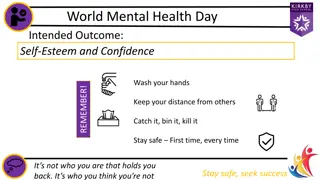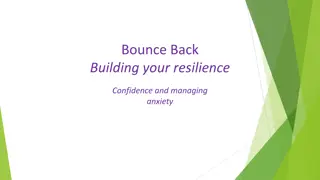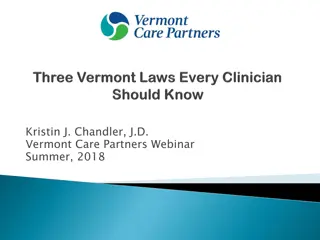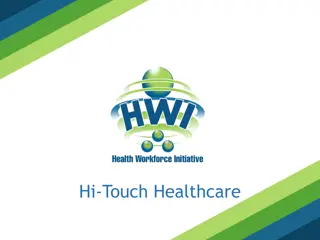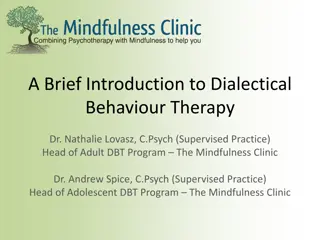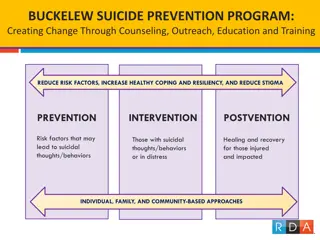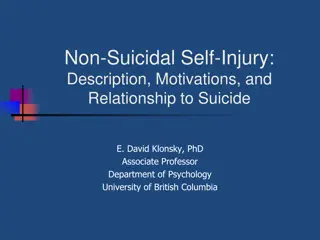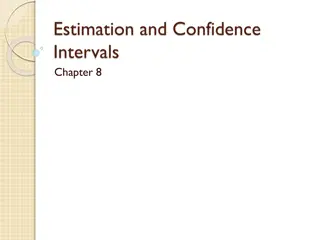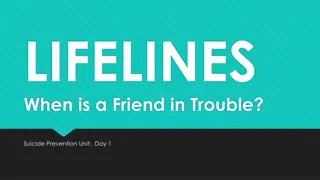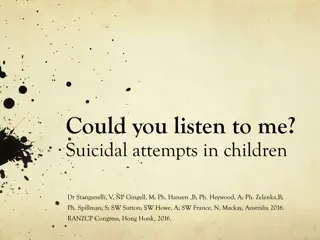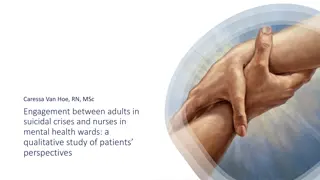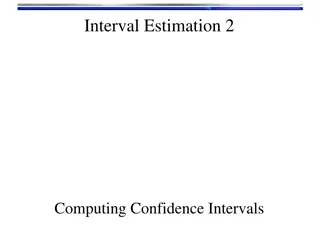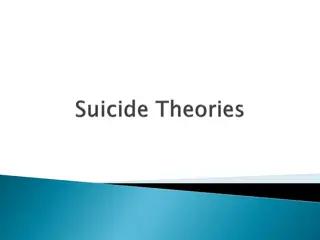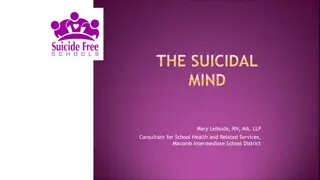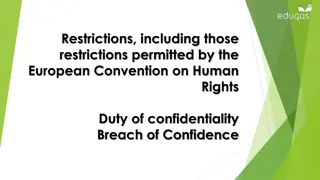Building Confidence to Help Suicidal Individuals
A guide to recognizing signs of suicidal behavior, including previous attempts, mental disorders, and social withdrawal. Learn how to identify warning signs, such as ideation, substance abuse, and feelings of hopelessness. Understand the importance of intervention and support for those at risk of suicide.
Download Presentation

Please find below an Image/Link to download the presentation.
The content on the website is provided AS IS for your information and personal use only. It may not be sold, licensed, or shared on other websites without obtaining consent from the author. Download presentation by click this link. If you encounter any issues during the download, it is possible that the publisher has removed the file from their server.
E N D
Presentation Transcript
We want to build your confidence in helping someone that might be suicidal.
You can plan a monologue but you can t plan a dialogue.
Previous attempts History of mental disorders History of substance abuse Family history History of child abuse Feeling hopeless Impulsive loss Physical illness Access to method Unwilling to seek help Isolated Concrete plans Belief others would be better off Wanting to join deceased loved one Prolonged stress due to financial difficulties, unemployment, etc.
A suicidal person may show signs by saying something like, I just want the pain to end or I can see a way out. May become socially isolated or withdrawn. May act irritable or agitated. Lose interest in things. Have the feeling of being a burden to others. Look for ways to kill themselves such as hoarding medicine.
80% of people suicidal display warning signs
I Ideation S Substance abuse P Purposeless A Anxiety T Trapped H Hopelessness W Withdrawing A Anger (uncontrolled) R Recklessness M Mood changes (dramatic) deation ubstance abuse urposeless nxiety rapped opelessness ithdrawing nger (uncontrolled) ecklessness ood changes (dramatic) Threatened or communicated Excessive or increased No reasons for living Agitation/Insomnia Feeling there is no way out Threatened or communicated Excessive or increased No reasons for living Agitation/Insomnia Feeling there is no way out From friends, family, society Rage, seeking revenge Risky acts, unthinking From friends, family, society Rage, seeking revenge Risky acts, unthinking
How often do you have thoughts of harming yourself? When is the last time you ve had these thoughts? When did these thoughts start for you? Do you notice when you have them? (i.e. if you can t get the baby to stop crying? When you haven t been able to sleep? Etc.) Have you had these thoughts before? When you have these thoughts, do you have a plan how you might harm yourself? Do you have access to this plan? Have you ever tried to harm yourself before? Tell me about your support system. Do you have anyone you can call to ask for help? Are you seeing a mental health provider? I want to make sure you re safe. Would you be willing to sign a no harm agreement? This means you will call the numbers on the agreement if you have these thoughts again. Would you be willing to go for an assessment?
DO: Be direct Talk openly Work to create support Get involved Seek help from supervisor Be nonjudgmental Take action DO NOT Do not act shocked Do not promise to keep a secret Do not try to cheer the person up Do not assume that the person will not attempt suicide
Receiving effective mental health care. Positive connections: family, friends, support system!! The skills and ability to solve problems.
EPDS Personal Safety Plan
How could you address: I think about suicide but I wouldn t do it. I attempted suicide two weeks ago by cutting my wrist and then I took pills. I miss ____ and I think about wanting to be with them. I have thoughts of hurting myself. I was driving and I thought about driving my car into a tree. Will CPS be called on me for going to the hospital for an assessment? What if the hospital wants to keep me (institutionalize)?
Remember YOU can and do make a difference
1-800-273 TALK (8255) National Mental Health Association NAMI: National Alliance on Mental Illness
Suicide Prevention Resources http://www.nmha.org/- Mental Health America PSI Warmline at 1-800-944-4PPD (4773) www.postpartum.net Postpartum Support International PSI is Postpartum Support International The PSI Warmline is a toll-free telephone number anyone can call to get basic information on postpartum depression and resources. Dial extension 1 for Spanish and extension 2 for English. The Warmline is answered Monday through Friday, 8am to 4:30pm Pacific. You are always welcome to leave a confidential message any time, however, and your call will be returned as soon as possible. Suicide Hotline 1-800-273-TALK http://www.nimh.nih.gov/health/topics/women-and-mental-health/index.shtml - National Institute of Mental Health http://www.womenshealth.gov/faq/depression-pregnancy.cfm - The National Women s Health Information Center http://www.webmd.com WebMD http://www.mededppd.com MedEd http://www.suicidology.org - American Association of Suicidology http://www.suicidepreventionlifeline.org/ - National Suicide Prevention Lifeline http://postpartumdadsproject.org/ - Postpartum Dads Project http://www.postpartumdads.org/ - Postpartum Dads PSI Weekly Phone Forums for dads every Monday (info on www.postpartum.net) http://postpartummen.com/forum/ - Postpartum Men Online Forum www.womensmentalhealth.com Massachusetts General Hospital Books: This Isn t What I Expected, The Mother to Mother Postpartum Depression Support Book, The Postpartum Husband: Practical Solutions for Living with Postpartum Depression Beyond the Blues: A Guide to Understanding and Treating Prenatal and Postpartum Depression, What Am I thinking? Having a Baby After Postpartum Depression Pregnancy Blues: What Every Woman Needs to Know About Depression During Pregnancy Non Thirteen Reasons Why, Jay Asher Suicide Prevention Resources This Isn t What I Expected, Karen Kleiman, MSW and Valerie Raskin, MD The Mother to Mother Postpartum Depression Support Book, Sandra Poulin The Postpartum Husband: Practical Solutions for Living with Postpartum Depression, Karen Kleiman, MSW Beyond the Blues: A Guide to Understanding and Treating Prenatal and Postpartum Depression, Pec Indman, MFT and Shoshanna Bennett, PhD What Am I thinking? Having a Baby After Postpartum Depression., Karen Kleiman, MSW Pregnancy Blues: What Every Woman Needs to Know About Depression During Pregnancy, Shaila Misri, MD Non- -Pharmacologic Treatments for Depression in New Mothers, Pharmacologic Treatments for Depression in New Mothers, Kathleen Kendall-Tacket PhD, IBCLC
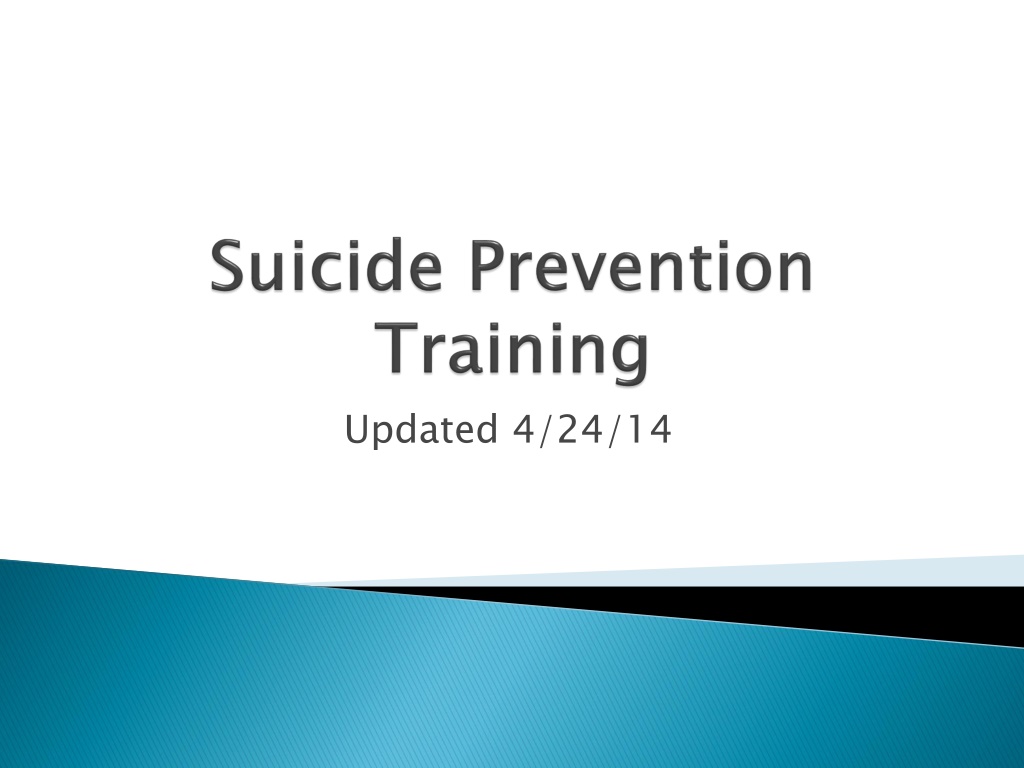
 undefined
undefined









